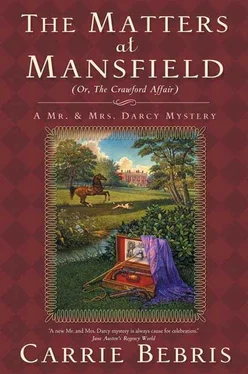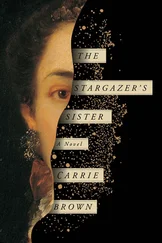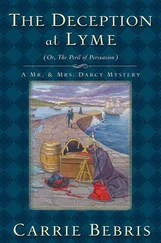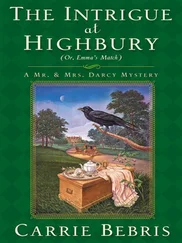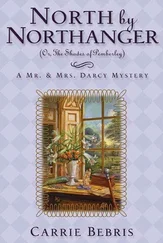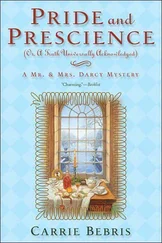“Self-murder?” He shook his head. “No — that cannot be.”
Yet even as he spoke, he privately admitted the possibility. Goethe’s novel appealed to romantic, impulsive young men, and Henry Crawford had proved himself both.
“This would seem to support Mr. Stover’s hypothesis.” Sir Thomas handed Darcy a water-stained note. “It is the only other item we found on Mr. Crawford’s person.”
Darcy unfolded the paper. Though the rain that had caused the ink to run had dried, humidity had left the paper damp, and black india stained Darcy’s gloves. Most of the words were obscured by smears and blots; Darcy could make out but two: “honor” and “forgiven.”
Yes, it could be a suicide message, Mr. Crawford’s final apology for his actions before taking his life. But the consequences of self-murder were too severe for the pronouncement to be made without absolute certainty. Suicide was more than just a crime against God; it was a crime against the king. Self-murderers could not be buried in consecrated ground, and their property was forfeited to the Crown. Anne’s grief and shame would be compounded, and, were her erstwhile marriage even deemed valid, she would receive nothing for all the misery it had caused her.
Darcy met Sir Thomas’s gaze. “This note could have said anything.”
“Including farewell.”
“There is ample room for doubt.”
“Not when considered with the other evidence.” The coroner stepped around the body and picked up the pistol. He turned it over in his hands, tracing the escutcheon and other engravings with his fingertip. “This is an expensive firelock. If someone else shot Mr. Crawford, why did he leave it behind?”
“Perhaps to make it appear a case of self-murder. There are many in this village with cause to wish Mr. Crawford ill.” Including Sir Thomas. Darcy fervently hoped the magistrate would not allow personal prejudice to influence his actions on so serious an issue. “Perhaps one of the people he wronged decided that depriving Mr. Crawford merely of his life was insufficient retribution. Contriving to have the death ruled a suicide would constitute complete revenge.”
“Indeed, it would,” Sir Thomas said, “but the fact that there might be others interested in taking Mr. Crawford’s life does not eliminate the possibility that he spared them the trouble.”
“Where did he obtain the pistol? I do not recall his having one among his possessions.”
“Can you say with certainty that he did not? That this is not his weapon?”
Darcy paused. “No. But he traveled here lightly—”
“Following his elopement, Mrs. Norris tells me. Perhaps he anticipated trouble en route to Gretna Green, particularly if he and his bride journeyed by night, and armed himself to ward off highwaymen — or friends of the bride who might pursue them. This is a small weapon, as pistols go, and easily concealed.”
“I wonder that Mrs. Norris would happen to share the circumstances of Mr. Crawford’s arrival with you, or how she even came into possession of her information,” Darcy said.
“She mentioned the news during a visit to my wife earlier this week. My sister-in-law makes it her business to stay informed of goings-on in the village, and to keep us similarly apprised.”
The gamekeeper stifled a cough.
The sound drew Sir Thomas’s attention. “Have you something to say, Mr. Cobb?”
“No, sir.”
Sir Thomas stepped back a few feet from the corpse. “Pray, let us move upwind, or better still, conclude this quickly. Now that the sun has risen above the trees I find the smell overpowering.”
Darcy had to concur with Sir Thomas’s complaint; the gamekeeper also appeared more than happy to relocate. Only the coroner seemed impervious to the odor as he continued to study the pistol. Darcy wondered how often he was exposed to such gruesome scenes.
Mr. Stover at last left the corpse’s side and joined them. “This is certainly a fine weapon. Pierced side plates, gold touch holes, crowned muzzle. Not one I would leave behind, revenge or no. But a dramatic choice for a dramatic act.”
“May I?” Darcy asked.
The coroner handed the smoothbore to Darcy. It was indeed a finely crafted weapon, fashioned of a rich brown walnut stock with a curved, deeply chequered grip and carved butt cap. Its case-hardened lock and hammer were engraved with images of a rook — or perhaps it was a crow or raven — and the polished silver escutcheon featured the same. The lock facing carried a London label with the crossed-pistols-and-swords mark of the arm’s renowned maker; the top flat of its blued octagonal barrel boasted his name, inlaid in gold: “H. W. Mortimer, Gun Maker to His Majesty.”
It was not so much a weapon as a work of art, and it was with reluctance that Darcy surrendered it to Sir Thomas. He privately agreed with Mr. Stover: One would not sacrifice so valuable an arm easily.
His gaze strayed toward the place beside Mr. Crawford where the pistol had lain, but his eye stopped instead on a spot of color in an area of particularly tall grass between him and the deceased. He had not noticed it before, but from his new vantage point upwind he could see something gold caught at the base of overhanging blades. Curious, he walked over to it, nearly tripping over a large rock also hidden in the grass but one stride from his quarry.
It was a circle of silk about two inches in diameter, gold with a pattern of tiny indigo birds lined up like chessmen on a field of or. Its edges were frayed, and three blackened hairline abrasions on its underside radiated out from a scorched bull’s-eye perhaps a half-inch round.
“What have you there?” Sir Thomas asked.
“A gun patch,” Darcy replied. The circles of fabric were used to load firelocks; the patch was inserted between the powder and the lead ball, and expelled when the weapon was discharged. The shot patch generally fell to the ground a few feet from the muzzle.
The quality of this particular fabric surpassed what one generally used to load weapons. Linen was far more common, and Darcy’s choice when hunting. Silks, valued for their strength and sheerness, were sometimes used in critical situations where accuracy was vital, but even then tended to be plain, not employ costly dyes or weaves. This was a singularly expensive gun patch. And Mr. Crawford had been killed by an expensive gun.
Darcy brought the patch to Sir Thomas and the coroner. “If Mr. Crawford indeed shot himself, how did the discharged patch land so far from his body?”
“He has lain here for days,” replied Mr. Stover, “with animals coming and going to an extent that one wishes were far less evident. Any number of creatures could have carried it hither.”
“Maybe it is not his patch,” added Sir Thomas. “Mr. Crawford is hardly the only person ever to fire in these woods. My eldest son and his friends often shoot for sport. The patch could have fallen there on an entirely different occasion, perhaps not even a recent one.”
Darcy conceded the possibility, but the fabric did not appear as if it had been tossed about the grove for months. Though the patch had been somewhat sheltered from this week’s intermittent rain by the overhanging grass, the area had received such heavy downpours in the days leading up to Mr. Crawford’s arrival in Mansfield that had the cloth been exposed to those tempests it would have been muddied or its black powder residue washed out to a much greater extent. If this patch had landed in the grove earlier, it had not preceded the night of Mr. Crawford’s disappearance by long.
In addition to the fabric itself being a curious choice for sport shooting, the design was one Darcy had never previously encountered, and the fact that both it and the pistol were ornamented by images of birds heightened his interest. “This is an unusual pattern,” Darcy said. “Do you recognize it as one Mr. Bertram uses for his rifle?”
Читать дальше
